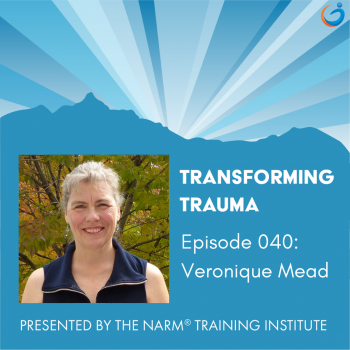Transforming Trauma Episode 040: ACEs, Developmental Trauma, and Chronic Illness with Veronique Mead
A podcast brought to you by the NARM® Training Institute
In this episode of Transforming Trauma, our host Sarah Buino is joined by somatic therapist Veronique Mead, a former practicing physician and assistant professor of family medicine. For 20 years Veronique has been researching and integrating science with her personal journey of chronic fatigue syndrome, finding powerful evidence of the connection between childhood adversity and chronic illness. Veronique’s findings align with the growing body of research about the impact of Adverse Childhood Experiences (ACEs) on our health.
Veronique shares about her experiences of living with and recovering from chronic illness. She talks about her decision to leave her medical career at the onset of her chronic fatigue syndrome, some 20 years ago, and retraining as a somatic therapist, where she learned about complex trauma. That education in trauma, combined with her own illness, made her curious. She says, “I started looking at the research with the simple question of, is there any evidence that trauma or adversity is a risk factor for any kind of chronic illness?” Her findings overwhelmingly said yes.
And yet, as Veronique points out, the lack of trauma education in the medical field often leaves patients and providers working with chronic illness frustrated and misinformed. Sarah and Veronique explore how traditional models of healthcare instill a belief that people can and will be fixed, a belief Veronique views as traumatic, not only for patients seeking help, but also for physicians and healthcare professionals who have been taught that they need to provide all the answers. She says that the traditional medical model “doesn’t yet understand or see, or recognize even, the link between life experiences and how they embed into our biology through epigenetics and nervous system development and that whole process early in life, in particular.”
Veronique highlights the need for a more nuanced, subtle view of trauma that she says is often overlooked. She and Sarah share their parallel experiences of encountering the ACEs study, and how each initially identified as having 1 or no ACEs. Only after further inquiry and their own personal therapy work did both of them realize they actually score much higher.
From a desire to expand upon the original 10 ACEs and to support more nuance and subtlety, Veronique created a framework she calls ACEs + (plus), “for all the stuff that doesn’t fit in ACEs before your 18th birthday.” She says, “As I looked at my own sense that I had no ACEs, it made me call this whole other category ‘invisible ACEs.’”
Veronique goes on to describe these ACEs + and how they influence risk for all kinds of chronic illness. Included in her ACEs + are developmental, environmental, relational, and generational factors, as well as adulthood categories (ie. accidents, injuries, job loss, divorce, medical procedures), which she says often occur “over a number of years or a decade, and then one final event will trigger the onset of the chronic illness.”
As Veronique and Sarah explore the topic of developmental trauma and its impact on long-term health, they find much overlap between the way Veronique frames her understanding and the NARM model. Both perspectives are based in a non-pathologizing orientation and view symptoms as intelligent, survival responses to environmental failures.
Veronique and Sarah conclude the episode discussing the beauty in understanding and recognizing our own trauma and adversity experiences, and how they affect us personally. Veronique closes with her own feelings of hope: “Once we understand [how adverse childhood experiences impact our development]…it removes blame and shame and judgment because it’s not something we’ve actually done…If we can shift the perception of threat that’s gotten caught…it then gives us all these tools to work with that may really contribute to a much higher, greater capacity for healing and improvement…Then there may be a whole lot more encouraging, hopeful, empowering things we can do.”

Subscribe for All Episodes
on your Favorite Service:
We want to connect with you!
Facebook @NARMtraining
Twitter @NARMtraining
YouTube
Instagram @thenarmtraininginstitute
Learn more about The NARM Training Institute: http://www.narmtraining.com
Sign up for a free preview of The NARM Inner Circle Online Membership Program: http://www.narmtraining.com/freetrial
About Veronique:
Veronique Mead was an Assistant Professor of Family Medicine and practicing physician when she decided to change careers and retrained as a Somatic Trauma Therapist. For the past 20 years she has been integrating the science with her personal journey of gradual recovery from disabling chronic fatigue syndrome into a new model for making sense of chronic illnesses of all kinds.The research explains how effects of trauma are not psychological as is still often mistakenly believed. She shares the science on her blog, Chronic Illness Trauma Studies.com.
Contact Veronique:
www.chronicillnesstraumastudies.com
www.facebook.com/chronicillnesstraumastudies